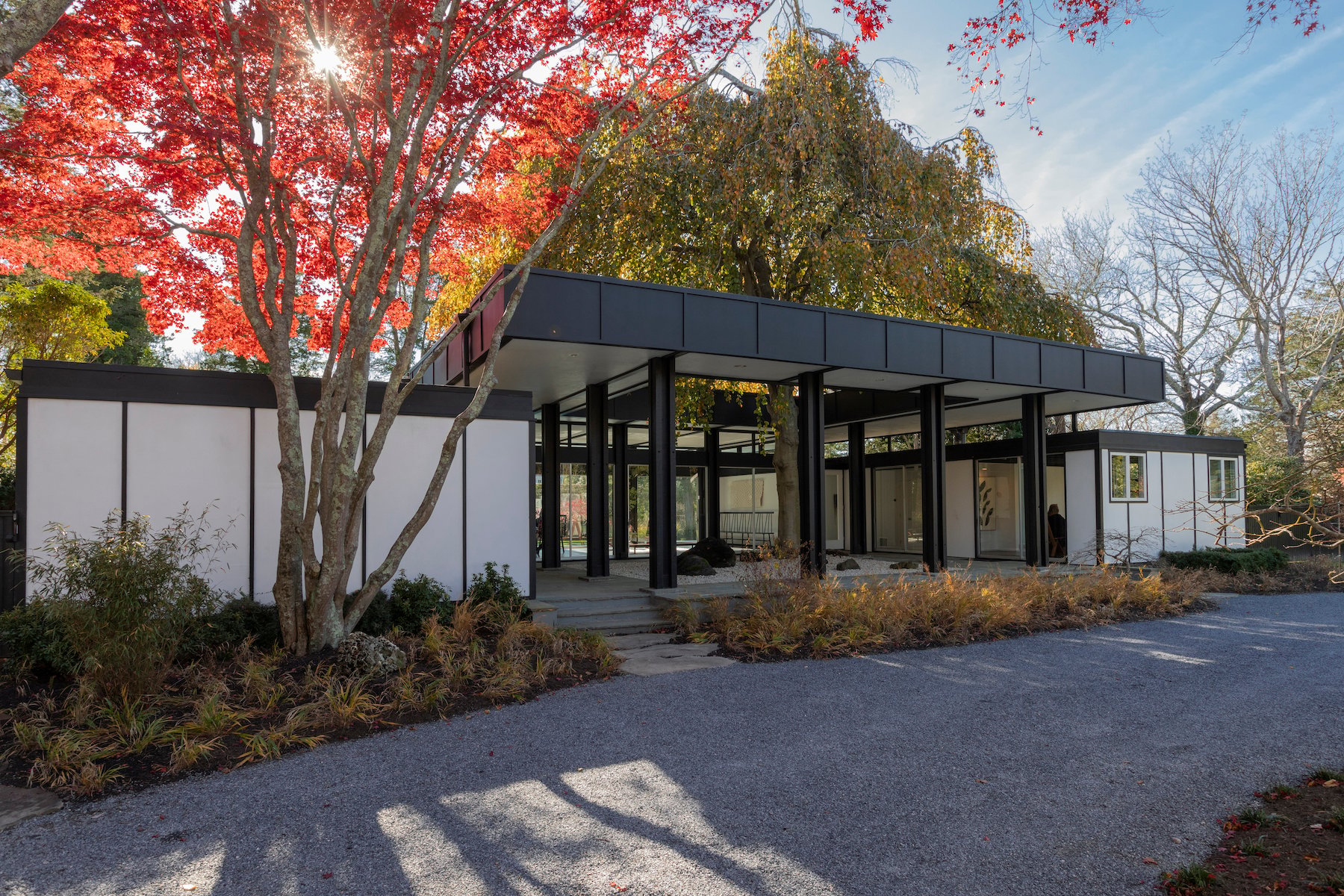
The fashion designer Lisa Perry was scrolling through Instagram when she spotted photographs of an endangered Modernist marvel of architecture in the woods of East Hampton. The Long Island getaway—a glass-and-steel house built by the midcentury architect Paul Lester Wiener—needed a champion.
Commissioned by the legendary art collectors Ethel and Robert Scull in 1962, the house’s crisp details reminded Perry of her own childhood home in the Chicago suburbs. And despite her retro-inflected collections, the designer wasn’t interested in strictly recreating the past. When Perry received keys to the $4 million Hamptons hideaway in January 2021, she decided to transform it into a new art gallery.
Lisa Perry at Onna House, her new gallery space in East Hampton. Photo: Jordan Tiberio.
Onna House, at 123 Georgica Road, will open this spring as a space devoted to the work of women artists and designers. (The word onna, pronounced own-ah, is an homage to the Japanese word for woman.) Perry hired the architect Christine Harper to renovate the house, turning its four-bedroom layout into a series of galleries and areas for entertaining. The transformation of the Sculls’ former home comes as other architecturally significant midcentury buildings are being destroyed on Long Island. A house designed by Marcel Breuer in 1945 was demolished by its owners in January despite an effort by preservationists to save the structure.
“I wanted to restore the house and stay true to the architect’s vision,” Perry told Artnet News. “A main goal of ours is to foster visibility and help the artists sell their work—highlighting those who have been under-recognized and who we believe deserve to be known and celebrated.”
The main room at Onna House, revamped by architect Christine Harper and featuring sculptures by Linda Miller and Kelly Klein; furniture by Kelly Behun, Charlotte Perriand, and Anna Karlin; and a rug by Anni Albers. Photo: Jordan Tiberio.
Although she is not an art dealer by training, Perry, 64, has spent the last 35 years amassing a major private collection of Pop and Minimal art alongside her husband, the hedge-fund manager Richard Perry. The collection includes big names like Andy Warhol, Roy Lichtenstein, and Ellsworth Kelly; however, the fashion designer says that an early purchase was an artwork by the naturalist illustrator Walton Ford. Since then, the collection has grown to include artists like Jennifer Bartlett, Jenny Holzer, and Barbara Kruger.
Open by appointment only, the gallery currently hosts a mix of works by local and international artists from Perry’s collection, including Kelly Behun, Nodoka Yamaura, Nina Cho, and Toni Ross, which are not for sale. The East Hampton antiques dealer Russell Steele has helped guide Perry’s selections, encouraging her to include local artists alongside those the fashion designer has supported in Japan.
The guesthouse at Onna House, with Natalie Munk’s Carmen (2002). Photo: Jordan Tiberio.
When Onna House opens to the public on May 28, it will feature “Listening to the Thread,” a selling exhibition of vibrant, geometric fiber works by the Japanese textile artist Mitsuko Asakura, who compares the use of color in weaving to that of Pointillism in art. The space will also include the designer Ligia Dias’s paper dress collection, jewelry, and mirrors. Perry said that she will hold three exhibitions through the summer; plans for the fall and winter are still being finalized.
The sitting room at Onna House, featuring a textile work by Mitsuko Asakura and chairs by Janine Abraham. Photo: Jordan Tiberio.
Looking toward the future, the newly minted gallerist hopes to create nontraditional residencies for creators looking for a short-term getaway.
“Artists have said, ‘We would love to go to Onna House for the day, work together with another artist, and go home at night,’” explained Perry. “I want it to be a collaborative space.”
The shape of future residencies is still being determined, but Perry made sure to expand the Modernist house’s kitchen area to accommodate culinary masters as well. “I might have a Japanese chef come and spend some time as a resident because sushi is art,” she said. “I’m mesmerized watching her do her thing.”